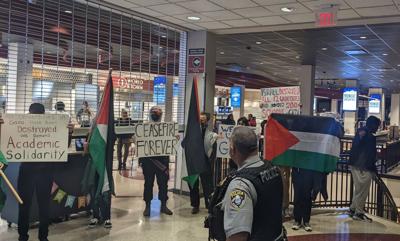COLUMBIA — Pro-Palestinian activists are hoping to bring the energy of rapidly escalating Northeast campus protests against the Israel-Hamas war to the University of South Carolina in the final days of the school year.
USC has seen two demonstrations in two days, an escalation of activity on the campus as students finish classes.
A group of chanting protesters carrying Palestinian flags and signs stood inside the Russell House student center the night of April 23, ahead of the school's "midnight breakfast" event meant to mark the beginning of final exams, which started April 24.
The protestors left the building without incident, though shadowed by university police, as the breakfast was scheduled to start at 10 p.m.
The Russell House demonstration came a day after around a dozen students and activists set up a "Gaza solidarity" demonstration on a field between the university's library and student center, erecting tents, laying out blankets, posting signs and leading pro-Palestinian and anti-Israeli chants.
That same night, both the last day of classes and the first day of the Jewish Passover, a USC professor led a crowd of around 40 in a Seder, the traditional Jewish meal celebrating the start of Passover. The activists had hinted they intended to occupy the field — or "stay the f— put," as student-organizer Andrés Gonzalez put it — past the terms of their reservation for the space.

Pro-Palestinian protesters in the Russell House the night of April 23 at the University of South Carolina.
But students broke down the demonstration as dusk fell, avoiding anything resembling the dramatic confrontations between students and university administrations at a growing number of the country's colleges. Antiwar students at protests and encampments have been arrested in swaths at Columbia (New York) and Yale universities in the past week, fueling unrest among sympathetic students and faculty, and new encampments on other campuses.
“We support students and members of our community who wish to exercise their First Amendment rights and to peacefully protest,” USC spokesman Jeff Stensland said in a statement after the midnight breakfast protest. "Protestors do not have the right to infringe on others by preventing them from participating in planned campus events."
Even as the protests broke down without incident each night, organizers at the April 22 event urged students to return on April 24, when they said they planned to "occupy" the Russell House student union building "until the demands are met."
Those demands consist of the university completely separating from "any and all" ties with Israel. When asked for details, organizers pointed to financial investments held by the USC Foundation alongside items such as study-abroad trips and research funding.
As the sun began to set on April 22's demonstration, USC math professor Joshua Cooper led students in a Seder, retelling the story of ancient Israelites' freedom from slavery in Egypt.
Wearing a kippah and a keffiyeh, the black-and-white headscarf often used as a symbol of Palestinian nationalism, Cooper said Passover's liberatory message was "very appropriate" for such a setting.
"Close your eyes and kindle an image of hope that you can believe in," Cooper said. "May this year's Passover, Pesach, message of liberation be realized in a free Palestine before the year is over."

USC math professor Joshua Cooper, holding a piece of matzah, leads a Passover Seder at the April 22 "Gaza solidarity" demonstration at USC.
During the extensive protests at other universities, reports have emerged of some Jewish students feeling unsafe amid anti-Israel demonstrations. Cooper said earlier in the day that he would invite Jewish USC students who felt the same way to “come talk to us” and “have real conversations."
Not all agreed. USC junior Bari Klarberg, a business student who serves as president of the university’s Interfraternity Council, said it was a “scary time” to be Jewish as he sat near the demonstration.
“This entire period has been more frustration than anger,” Klarberg, who said he was born in Israel, said of the protests.
He attributed the demonstrations to a “selective education” about history, emphasizing what he described as Israel's important role as a Jewish “homeland” amid antisemitism and saying that some protesters weren't willing to have open conversations.
USC's campus had been mostly unaffected by the contentious demonstrations that broke out at some universities after the Oct. 7 attack on Israel by Hamas, which killed around 1,200 people, and the ensuing invasion of the Gaza Strip by the Israeli military, which has killed more than 34,000 people.
Protests related to the conflict in Columbia instead mostly stuck to the Statehouse grounds and the downtown area, with weekend pro-Palestinian marches sometimes slowing traffic in the capital city's downtown core.
But leaders of the USC demonstration on April 22, who are organizers with the USC and local chapters of the Party for Socialism and Liberation, a hard-left national group whose branded picket signs are ubiquitous at many street protests, said they see the country's escalating campus politics as an opportunity to "build the student movement" in Columbia.

Demonstrators during a Passover Seder led by USC math professor Joshua Cooper (left) during a campus demonstration April 22.
Signs and speeches referenced the student uprising that plunged USC into chaos for days in May 1970, when around 40 radical students attempted to occupy the Russell House in the wake of the Kent State Massacre.
Their arrests, and anger over the Vietnam War and restrictive campus policies, fueled further protests, with students sacking the university's administration building and lobbing bricks and bottles at police and national guardsmen, who deployed tear gas on crowds of students as the governor declared a state of emergency.
For today's nascent antiwar campus movement, though, "it remains to be seen" how far student protesters are willing to go as the school year comes to a close, A.D. Foster, a former USC student and PSL organizer, said as they broke down the demonstration's tables April 22.






